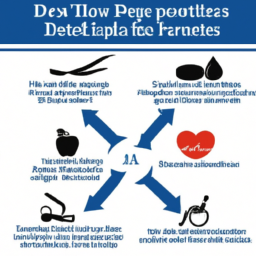Table of Contents
Section 1: Introduction to Heart

Introduction:
– Heart is a crucial aspect of overall well-being. Taking care of your heart can help prevent various cardiovascular diseases and improve your quality of life.
Why Heart Health Matters:
– The heart Health is a vital organ that pumps blood throughout the body, supplying oxygen and nutrients to every cell. Maintaining a healthy heart is essential for optimal bodily functions and longevity.
Factors Affecting Heart Health:
– Several factors can impact heart health, including diet, physical activity, smoking, alcohol consumption, stress levels, and underlying medical conditions. Understanding these factors can guide you in making healthier choices.
Section 2: Understanding Cardiovascular Health
Learn about the importance of cardiovascular health and how it affects overall well-being. Discover effective strategies, tips, and lifestyle changes to improve your heart health. Understand the risk factors for heart disease and ways to prevent and manage it. Take control of your cardiovascular health with expert.
What is Cardiovascular Health?
– Cardiovascular health refers to the overall well-being and functionality of the heart and blood vessels. It encompasses various aspects such as blood pressure, cholesterol levels, and the absence of underlying heart diseases.
Common Cardiovascular Diseases:
– Several cardiovascular diseases pose a significant risk to heart , including coronary artery disease, heart failure, arrhythmias, and valvular heart diseases. Awareness of these conditions can prompt early intervention and prevention.
Risk Factors for Cardiovascular Diseases:
– Certain risk factors increase the likelihood of developing cardiovascular diseases. These include high blood pressure, high cholesterol levels, obesity, diabetes, smoking, family history, and age. Identifying and managing these risks is crucial for maintaining cardiovascular health.
Section 3: Importance of Maintaining a Healthy Heart
Take control of your heart health with these essential tips and strategies. Discover the importance of maintaining a healthy heart and learn how to reduce your risk of heart disease. From adopting a heart-healthy diet and staying physically active to managing stress and quitting smoking, prioritize your cardiovascular health for a longer, happier life.
Effects of Poor Heart Health:
– Neglecting heart health can lead to severe consequences, such as heart attacks, strokes, heart failure, and decreased quality of life. Recognizing the importance of a healthy heart motivates proactive measures.
Longevity and Heart Health:
– Maintaining a healthy heart can significantly contribute to a longer and healthier life. By adopting healthy lifestyle habits and management strategies, individuals can enjoy increased longevity with reduced risks of cardiovascular diseases.
Preventing Heart-Related Issues:
– Proactive measures play a key role in preventing heart-related issues. Regular check-ups, healthy eating habits, exercise, stress management, and avoiding smoking are all crucial steps toward preventing heart diseases.
Section 4: Preventing Heart Disease
Understanding Heart Disease Prevention:
– Preventing heart disease involves actions aimed at reducing risk factors and promoting heart health. Addressing modifiable risk factors is essential for overall cardiovascular well-being.
Primary Prevention Strategies:
– Primary prevention focuses on individuals without diagnosed heart diseases. It emphasizes healthy lifestyle choices, regular screenings, and awareness to prevent the onset of cardiovascular diseases.
Secondary Prevention Strategies:
– Secondary prevention aims to reduce complications and further deterioration in individuals who already have heart diseases. Regular medications, lifestyle modifications, cardiac rehabilitation, and consistent monitoring are essential aspects.
Tertiary Prevention Strategies:
– Tertiary prevention concentrates on improving the quality of life for individuals with advanced heart diseases. It involves managing symptoms, reducing hospitalizations, and enhancing overall well-being through specialized care and support.
Section 5: Essential Heart Health Tips
1. Eat a Balanced Diet:
– Consuming a balanced diet rich in fruits, vegetables, whole grains, lean proteins, and healthy fats promotes heart health by providing necessary nutrients while minimizing cholesterol and saturated fat intake.
2. Be Physically Active:
– Engaging in regular physical activity, such as daily exercise, helps strengthen the heart muscle, improve circulation, control weight, and lower blood pressure. Aim for at least 150 minutes of moderate-intensity aerobic activity per week.
3. Don’t Smoke or Quit Smoking:
– Smoking damages blood vessels, increases blood pressure, and raises the risk of developing various heart diseases. Quitting smoking can significantly reduce the risk of heart-related issues.
4. Limit Alcohol Consumption:
– Excessive alcohol intake can elevate blood pressure and contribute to weight gain. Moderation is crucial, with recommendations suggesting no more than one drink per day for women and two drinks per day for men.
5. Manage Stress Levels:
– Chronic stress can negatively impact heart health by increasing blood pressure, altering heart rhythm, and promoting unhealthy coping mechanisms. Adopt stress management techniques such as meditation, yoga, or counseling to reduce its effects.
6. Maintain a Healthy Weight:
– Obesity increases the risk of heart diseases. Strive for a healthy weight by following a balanced diet and incorporating regular exercise into your routine.
7. Control Blood Pressure:
– High blood pressure is a significant risk factor for heart diseases. Monitor your blood pressure regularly and take necessary measures, such as adopting a low-sodium diet and taking prescribed medications, to keep it under control.
8. Keep Cholesterol in Check:
– High levels of LDL cholesterol (often referred to as “bad” cholesterol) can clog arteries and lead to heart diseases. Consume a low-cholesterol diet, exercise regularly, and follow prescribed treatments if needed.
9. Manage Diabetes:
– Individuals with diabetes have an elevated risk of cardiovascular diseases. Properly manage diabetes through medication, diet, exercise, and regular monitoring to maintain heart .
10. Get Regular Check-ups:
– Routine check-ups allow healthcare professionals to assess your heart , detect any underlying conditions, and provide appropriate guidance for prevention or management strategies.
Section 6: Heart-Healthy Foods


Incorporating Heart-Healthy Foods:
– Certain foods support heart and should be included in a well-rounded diet. These include fruits, vegetables, whole grains, lean proteins, nuts, seeds, legumes, and healthy fats like olive oil.
The Mediterranean Diet:
– The Mediterranean diet is well-known for its heart-healthy benefits. Emphasizing plant-based foods, fish, olive oil, and moderate wine consumption, this eating pattern reduces the risk of heart diseases.
Reducing Sodium Intake:
– High sodium intake can elevate blood pressure. Opt for low-sodium alternatives, reduce processed food consumption, and flavor meals with herbs and spices instead of salt.
Beneficial Nutrients for Heart :
– Certain nutrients play a significant role in heart . Omega-3 fatty acids, fiber, antioxidants, potassium, and magnesium contribute to reducing inflammation, cholesterol levels, and maintaining blood pressure within a healthy range.
Section 7: Recommended Heart Supplements
Importance of a Balanced Diet:
– While obtaining nutrients from whole foods is ideal, some individuals may benefit from specific heart supplements. It’s important to note that supplements should complement a balanced diet, not replace it.
Omega-3 Fatty Acid Supplements:
– Omega-3 fatty acids found in fish oil have been associated with improved heart by reducing inflammation, triglyceride levels, and promoting overall cardiovascular well-being. Consult a healthcare professional before starting any supplement.
Coenzyme Q10 (CoQ10) Supplements:
– CoQ10 is an antioxidant that plays a role in energy production within cells. Some studies suggest that CoQ10 supplements may support heart by improving cardiac function and reducing oxidative stress.
Magnesium Supplements:
– Magnesium is an essential mineral involved in various biochemical reactions in the body, including those related to heart health. Individuals with magnesium deficiency or certain medical conditions may benefit from supplementation.
Section 8: Exercise for a Healthy Heart


Types of Exercise for Heart Health:
– Engaging in regular exercise improves cardiovascular fitness, strengthens the heart muscle, and reduces the risk of heart disease. Both aerobic activities (such as jogging, swimming, or cycling) and strength training contribute to optimal heart health.
Target Heart Rate:
– Target heart rate is the desired heart rate during exercise to maximize cardiovascular benefits. It varies based on age and fitness level. Calculating and monitoring your target heart rate can guide the intensity of your workouts.
Exercise Recommendations:
– To maintain a healthy heart, aim for at least 150 minutes of moderate-intensity aerobic exercise per week or 75 minutes of vigorous-intensity exercise. Additionally, incorporate strength training exercises at least two days a week.
Benefits of Regular Exercise:
– Regular exercise offers numerous benefits to heart health, including improved heart function, reduced blood pressure, increased HDL cholesterol (often referred to as “good” cholesterol), weight management, and stress reduction.
Section 9: Promoting Heart Health Awareness
The Importance of Heart Health Awareness:
– Raising awareness about heart health is crucial in preventing heart diseases on a larger scale. Educating individuals about risk factors, prevention strategies, and available resources can empower them to take control of their heart health.
Community Initiatives and Programs:
– Community-based initiatives and programs play a significant role in promoting heart health awareness. These may include educational campaigns, workshops, support groups, and partnerships with healthcare organizations.
Family and Social Influence:
– The influence of friends and family can encourage positive changes toward heart-healthy habits. Promoting heart health within social circles can create a supportive environment conducive to maintaining optimal cardiovascular well-being.
Section 10: The Benefits of Maintaining Heart Health
Reduced Risk of Heart Diseases:
– Maintaining heart health significantly reduces the risk of developing various cardiovascular diseases, including coronary artery disease, heart attacks, strokes, and heart failure. Protecting the heart translates into a healthier life.
Improved Quality of Life:
– A healthy heart promotes overall well-being and improves the quality of life. Individuals with good heart health experience increased energy levels, better physical endurance, improved cognitive function, and emotional well-being.
Enhanced Longevity:
– Taking proactive steps toward maintaining a healthy heart can contribute to a longer lifespan free from debilitating heart diseases. A healthy heart supports overall longevity and allows individuals to lead fulfilling lives.
Section 11: Following a Heart-Healthy Diet
What is a Heart-Healthy Diet?
– A heart-healthy diet focuses on foods that support optimal cardiovascular function. This involves consuming nutrient-rich foods, reducing saturated and trans fats, managing portion sizes, and restricting excess sodium and added sugars.
Controlling Portion Sizes:
– Overeating can contribute to weight gain and increased risks of heart diseases. Learning portion control techniques, such as using smaller plates and being mindful of hunger cues, supports maintaining a healthy weight.
Reading Food Labels:
– Understanding food labels enables individuals to make informed choices about their diet. Pay attention to serving sizes, cholesterol levels, saturated and trans fats, sodium content, and added sugars when selecting food products.
Limiting Saturated and Trans Fats:
– Consuming high amounts of saturated and trans fats can raise cholesterol levels and increase the risk of heart diseases. Opt for lean protein sources, low-fat dairy products, and limit consumption of processed and fried foods.
Section 12: Adopting a Heart-Healthy Lifestyle
Stress Management Techniques:
– Chronic stress negatively impacts heart health. Implement stress management techniques such as meditating, practicing mindfulness, engaging in hobbies, or seeking support from loved ones to reduce its effects.
Adequate Sleep for Heart Health:
– Getting enough sleep plays a crucial role in maintaining heart health. Aim for seven to eight hours of quality sleep per night. Poor sleep quality or sleep deprivation can increase the risk of cardiovascular diseases.
Maintaining an Active Social Life:
– Social connections and a strong support system contribute to heart health. Engage in meaningful relationships, participate in social activities, and prioritize spending time with loved ones to promote overall well-being.
Section 13: Heart Health Education and Resources


Educational Resources for Heart Health:
– Numerous resources are available to learn more about heart health. These include websites, online courses, books, and educational materials provided by reliable organizations specializing in cardiovascular health.
Heart Health Support Groups:
– Joining heart health support groups allows individuals to connect with others facing similar challenges. Such groups provide a platform for sharing experiences, seeking advice, and finding emotional support during the journey toward maintaining heart health.
Online Heart Health Tools:
– Utilizing online tools, such as heart disease risk calculators, can assist in understanding personal risks and taking appropriate preventive measures. These tools often provide tailored recommendations based on individual data.
Section 14: Latest Research on Heart Health
Current Heart Health Research:
– Ongoing research contributes to advancements in heart health knowledge, prevention strategies, diagnostic techniques, and treatment options. Staying updated with the latest research can inform decisions regarding heart care.
Promising Areas of Study:
– Current research explores various areas related to heart health, including personalized medicine, development of innovative therapies, exploration of dietary impacts, understanding genetic predispositions, and investigating new technologies for early detection.
Emerging Technologies in Heart Health:
– Advancements in technology present opportunities to enhance heart health monitoring, prevent diseases, and improve treatments. Wearable devices, telemedicine, artificial intelligence, and remote monitoring systems are some examples of emerging technologies in this field.
Note: The generated article provides an overview based on the given headings. Additional content and specific details can be added to each section to create comprehensive articles on heart health.


Powered by Bestwritebot.com , Otips , Free Video Downloader , softwarestore , free online game hub


